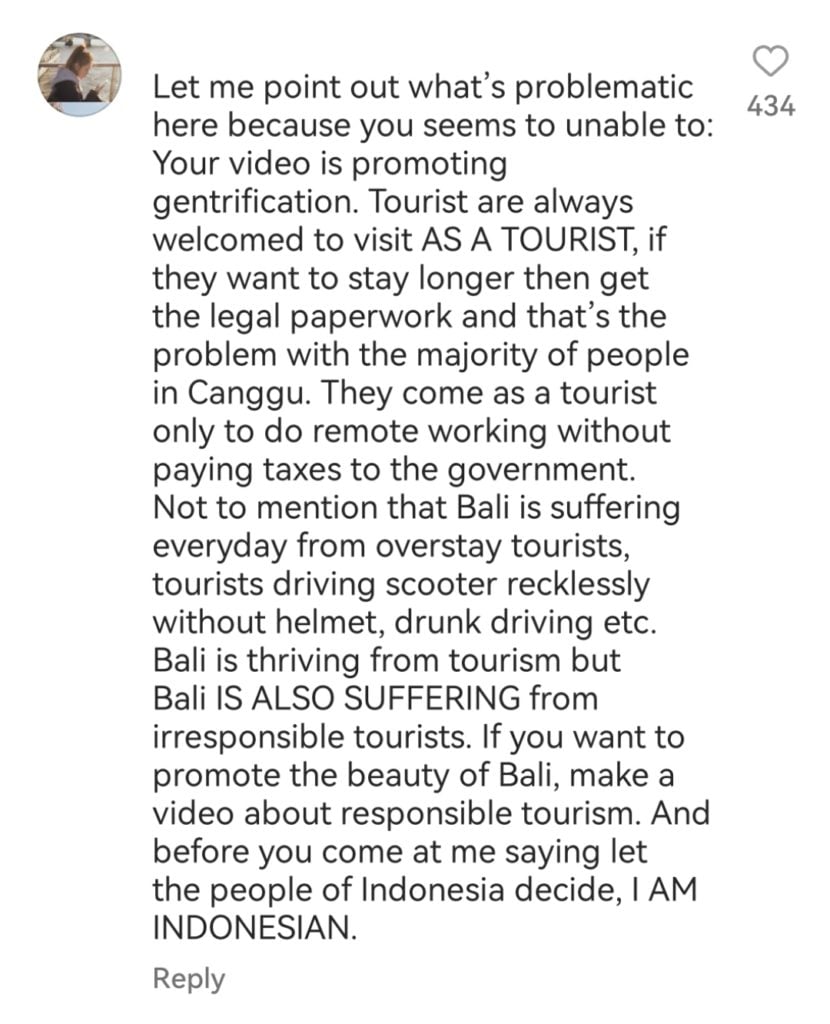Oh, Nas Daily.
Just when we thought the prominent issues surrounding Nas Daily had cooled down, the popular travel vlogger is once again under fire as he has figured himself into another controversy.
After being banned from Indonesia in 2018 for holding an Israeli passport, Nuseir Yassin, the man behind the popular Nas Daily brand on social media, was finally able to enter the country. Yassin, true to his travel vlogging nature, created content after content during his visit to the country to showcase the beauty of Indonesia. But one video, in particular, has caught the ire of many people across the internet.
In a video he posted on February 8, Yassin expressed his awe at the number of white tourists visiting and living in Bali, which prompted him to call the island “the whitest island in Asia.”
In the one-minute and 30-second video, Yassin pointed out that “everywhere you go, there are white people,” before continuing to list down the reasons why Bali successfully captured the attention of the Western world that made them stay and live on the island.
“One, nature. It’s stunning! Rice field after rice field. Everything around you is green,” Yassin said. “Two, the hospitality. Bali has some of the best hotels in the world with the best Indonesian hospitality.”
He added that another factor why many white tourists choose to stay on the island is that everything costs affordable prices to foreign tourists.
The last reason, according to Yassin, that attracted tourists is its transportation mode, which is riding a scooter. “No subway system. No bus. Just scooters in the green beautiful rice field,” Yassin explained.
While this video may look and feel harmless for some and might think it’s just a pitch to tourists to come to Bali, the video, however, has drawn flak for a number of reasons, with some claiming that Yassin’s travel vlog does not represent Bali as a whole.
Some people were not too pleased as the video seemed to be promoting gentrification, a term used to describe the process where wealthy people migrate to poor and working-class communities.
On the other hand, others have also pointed out that Yassin didn’t cover “any critical aspect of (white) tourism” and failed to mention the social issues Bali is facing.
After the criticisms he received, Yassin didn’t pass up the chance to defend himself and his content.
But instead of addressing the concerns raised by most people on the internet about how problematic his video is, the content creator lashed out at them.
“‘White people living in Bali angry at Brown man for telling the world white people life in Bali.’ Thank you all for the comments. I will make another video titled: ‘Let’s talk about race’ and I think it’ll be a great conversation for all of us to have,” he wrote.
This isn’t the first time Yassin has embroiled himself in controversies for some of his videos deemed “problematic.”
In 2018, the travel vlogger was under fire for posting a five-minute video explaining how Singapore was “the almost perfect country.” Much like the comments in his recent Bali video, many criticized Yassin for not pointing out the reality of living in Singapore.
Three years later, during the COVID-19 pandemic, his name trended once again after Filipino entrepreneur Louise Mabulo, founder of The Cacao Project, shared her negative experiences with the vlogger.
Mabulo has accused the content creator of allegedly mocking the local people and imitating the language and accent; Pinoy baiting, a strategy used by content creators to lure Filipino audiences for views; and for not caring about “shedding light on real issues.”
The same year, Yassin was also accused of exploiting 104-year-old revered Filipino tattoo artist Apo Whang-od for his Nas Academy, a “Creator Accelerator Program” that helps aspiring content creators.
Yassin was called out by Apo Whang-Od’s grandniece, saying that the online class offered was a “scam,” which led him to take it down. The National Commission on Indigenous Peoples (NCIP) also revealed that the tattoo lessons, which would charge P750 per registrant, advertised by the online academy wasn’t consented to by Apo Whang-od as she denied “affixing her thumb mark to any contract for such online academy.”
The controversies didn’t stop there because, in 2022, Yassin featured and interviewed Sam Bankman-Fried, known as SBF, the founder of the now-bankrupt cryptocurrency company FTX. The content creator even called SBF the “most generous billionaire in the world” as the billionaire “believes in the concept of ‘earn to give.’”
However, the vlog was then deleted after SBF faced several charges filed by the US Securities and Exchange Commission after his company went bankrupt, such as wire fraud, commodities fraud, securities fraud, and money laundering.
At this point, people (us included) are no longer surprised when Yassin’s name will trend once again.
Here’s to hoping he can learn from his mistakes, start listening to criticisms, and take accountability for his actions.
Other POP! stories that you might like:
The Nas Daily issue reveals the worst (and funniest) of chismosa culture
Pinoy baiting should seriously stop, like right now
School girl who earns millions per month through own business retires to focus on studies
Avatar: The Way of Water overtakes Titanic, becomes the third-highest-grossing film of all time
Jisoo officially starts filming of solo MV–the most expensive among all BLACKPINK videos
Subscribe to our daily newsletter
[forminator_form id=”331316″]
